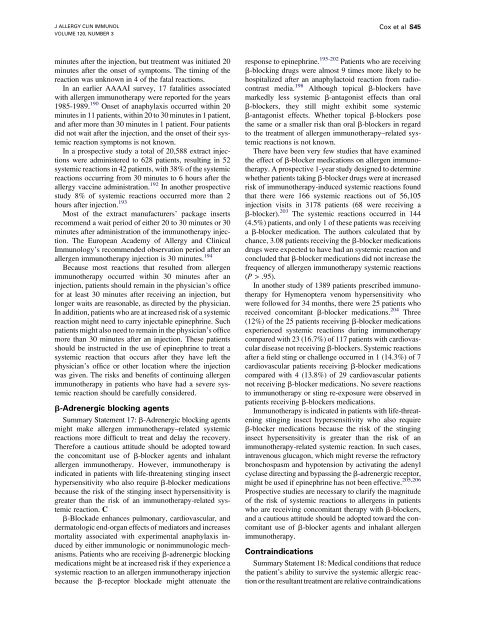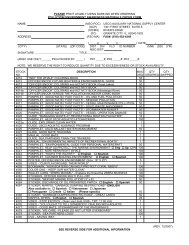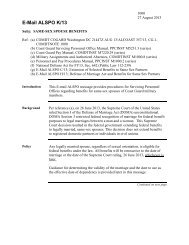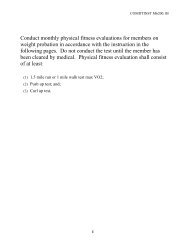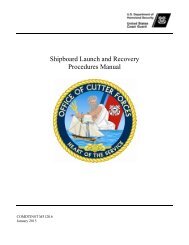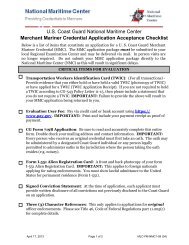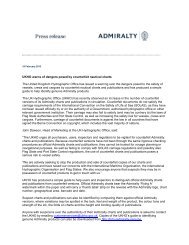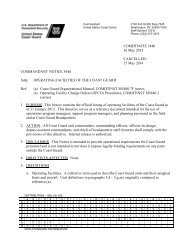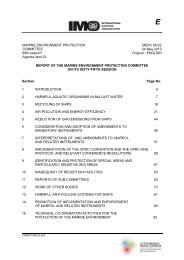Immunotherapy Safety for the Primary Care ... - U.S. Coast Guard
Immunotherapy Safety for the Primary Care ... - U.S. Coast Guard
Immunotherapy Safety for the Primary Care ... - U.S. Coast Guard
Create successful ePaper yourself
Turn your PDF publications into a flip-book with our unique Google optimized e-Paper software.
J ALLERGY CLIN IMMUNOL<br />
VOLUME 120, NUMBER 3<br />
Cox et al S45<br />
minutes after <strong>the</strong> injection, but treatment was initiated 20<br />
minutes after <strong>the</strong> onset of symptoms. The timing of <strong>the</strong><br />
reaction was unknown in 4 of <strong>the</strong> fatal reactions.<br />
In an earlier AAAAI survey, 17 fatalities associated<br />
with allergen immuno<strong>the</strong>rapy were reported <strong>for</strong> <strong>the</strong> years<br />
1985-1989. 190 Onset of anaphylaxis occurred within 20<br />
minutes in 11 patients, within 20 to 30 minutes in 1 patient,<br />
and after more than 30 minutes in 1 patient. Four patients<br />
did not wait after <strong>the</strong> injection, and <strong>the</strong> onset of <strong>the</strong>ir systemic<br />
reaction symptoms is not known.<br />
In a prospective study a total of 20,588 extract injections<br />
were administered to 628 patients, resulting in 52<br />
systemic reactions in 42 patients, with 38% of <strong>the</strong> systemic<br />
reactions occurring from 30 minutes to 6 hours after <strong>the</strong><br />
allergy vaccine administration. 192 In ano<strong>the</strong>r prospective<br />
study 8% of systemic reactions occurred more than 2<br />
hours after injection. 193<br />
Most of <strong>the</strong> extract manufacturers’ package inserts<br />
recommend a wait period of ei<strong>the</strong>r 20 to 30 minutes or 30<br />
minutes after administration of <strong>the</strong> immuno<strong>the</strong>rapy injection.<br />
The European Academy of Allergy and Clinical<br />
Immunology’s recommended observation period after an<br />
allergen immuno<strong>the</strong>rapy injection is 30 minutes. 194<br />
Because most reactions that resulted from allergen<br />
immuno<strong>the</strong>rapy occurred within 30 minutes after an<br />
injection, patients should remain in <strong>the</strong> physician’s office<br />
<strong>for</strong> at least 30 minutes after receiving an injection, but<br />
longer waits are reasonable, as directed by <strong>the</strong> physician.<br />
In addition, patients who are at increased risk of a systemic<br />
reaction might need to carry injectable epinephrine. Such<br />
patients might also need to remain in <strong>the</strong> physician’s office<br />
more than 30 minutes after an injection. These patients<br />
should be instructed in <strong>the</strong> use of epinephrine to treat a<br />
systemic reaction that occurs after <strong>the</strong>y have left <strong>the</strong><br />
physician’s office or o<strong>the</strong>r location where <strong>the</strong> injection<br />
was given. The risks and benefits of continuing allergen<br />
immuno<strong>the</strong>rapy in patients who have had a severe systemic<br />
reaction should be carefully considered.<br />
b-Adrenergic blocking agents<br />
Summary Statement 17: b-Adrenergic blocking agents<br />
might make allergen immuno<strong>the</strong>rapy–related systemic<br />
reactions more difficult to treat and delay <strong>the</strong> recovery.<br />
There<strong>for</strong>e a cautious attitude should be adopted toward<br />
<strong>the</strong> concomitant use of b-blocker agents and inhalant<br />
allergen immuno<strong>the</strong>rapy. However, immuno<strong>the</strong>rapy is<br />
indicated in patients with life-threatening stinging insect<br />
hypersensitivity who also require b-blocker medications<br />
because <strong>the</strong> risk of <strong>the</strong> stinging insect hypersensitivity is<br />
greater than <strong>the</strong> risk of an immuno<strong>the</strong>rapy-related systemic<br />
reaction. C<br />
b-Blockade enhances pulmonary, cardiovascular, and<br />
dermatologic end-organ effects of mediators and increases<br />
mortality associated with experimental anaphylaxis induced<br />
by ei<strong>the</strong>r immunologic or nonimmunologic mechanisms.<br />
Patients who are receiving b-adrenergic blocking<br />
medications might be at increased risk if <strong>the</strong>y experience a<br />
systemic reaction to an allergen immuno<strong>the</strong>rapy injection<br />
because <strong>the</strong> b-receptor blockade might attenuate <strong>the</strong><br />
response to epinephrine. 195-202 Patients who are receiving<br />
b-blocking drugs were almost 9 times more likely to be<br />
hospitalized after an anaphylactoid reaction from radiocontrast<br />
media. 198 Although topical b-blockers have<br />
markedly less systemic b-antagonist effects than oral<br />
b-blockers, <strong>the</strong>y still might exhibit some systemic<br />
b-antagonist effects. Whe<strong>the</strong>r topical b-blockers pose<br />
<strong>the</strong> same or a smaller risk than oral b-blockers in regard<br />
to <strong>the</strong> treatment of allergen immuno<strong>the</strong>rapy–related systemic<br />
reactions is not known.<br />
There have been very few studies that have examined<br />
<strong>the</strong> effect of b-blocker medications on allergen immuno<strong>the</strong>rapy.<br />
A prospective 1-year study designed to determine<br />
whe<strong>the</strong>r patients taking b-blocker drugs were at increased<br />
risk of immuno<strong>the</strong>rapy-induced systemic reactions found<br />
that <strong>the</strong>re were 166 systemic reactions out of 56,105<br />
injection visits in 3178 patients (68 were receiving a<br />
b-blocker). 203 The systemic reactions occurred in 144<br />
(4.5%) patients, and only 1 of <strong>the</strong>se patients was receiving<br />
a b-blocker medication. The authors calculated that by<br />
chance, 3.08 patients receiving <strong>the</strong> b-blocker medications<br />
drugs were expected to have had an systemic reaction and<br />
concluded that b-blocker medications did not increase <strong>the</strong><br />
frequency of allergen immuno<strong>the</strong>rapy systemic reactions<br />
(P >.95).<br />
In ano<strong>the</strong>r study of 1389 patients prescribed immuno<strong>the</strong>rapy<br />
<strong>for</strong> Hymenoptera venom hypersensitivity who<br />
were followed <strong>for</strong> 34 months, <strong>the</strong>re were 25 patients who<br />
received concomitant b-blocker medications. 204 Three<br />
(12%) of <strong>the</strong> 25 patients receiving b-blocker medications<br />
experienced systemic reactions during immuno<strong>the</strong>rapy<br />
compared with 23 (16.7%) of 117 patients with cardiovascular<br />
disease not receiving b-blockers. Systemic reactions<br />
after a field sting or challenge occurred in 1 (14.3%) of 7<br />
cardiovascular patients receiving b-blocker medications<br />
compared with 4 (13.8%) of 29 cardiovascular patients<br />
not receiving b-blocker medications. No severe reactions<br />
to immuno<strong>the</strong>rapy or sting re-exposure were observed in<br />
patients receiving b-blockers medications.<br />
<strong>Immuno<strong>the</strong>rapy</strong> is indicated in patients with life-threatening<br />
stinging insect hypersensitivity who also require<br />
b-blocker medications because <strong>the</strong> risk of <strong>the</strong> stinging<br />
insect hypersensitivity is greater than <strong>the</strong> risk of an<br />
immuno<strong>the</strong>rapy-related systemic reaction. In such cases,<br />
intravenous glucagon, which might reverse <strong>the</strong> refractory<br />
bronchospasm and hypotension by activating <strong>the</strong> adenyl<br />
cyclase directing and bypassing <strong>the</strong> b-adrenergic receptor,<br />
might be used if epinephrine has not been effective. 205,206<br />
Prospective studies are necessary to clarify <strong>the</strong> magnitude<br />
of <strong>the</strong> risk of systemic reactions to allergens in patients<br />
who are receiving concomitant <strong>the</strong>rapy with b-blockers,<br />
and a cautious attitude should be adopted toward <strong>the</strong> concomitant<br />
use of b-blocker agents and inhalant allergen<br />
immuno<strong>the</strong>rapy.<br />
Contraindications<br />
Summary Statement 18: Medical conditions that reduce<br />
<strong>the</strong> patient’s ability to survive <strong>the</strong> systemic allergic reaction<br />
or <strong>the</strong> resultant treatment are relative contraindications


